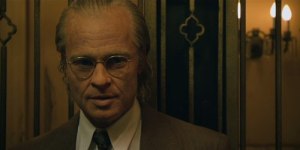
Benjamin Button has no particular button, not even, as far as we get to see, a belly button; nor does he find buttons interesting (even when he comes to own a factory that makes them), nor is especially tickled by anybody else’s buttons or by the idea of buttoning up or buttoning down. He gets younger all the time, if you can believe that. You can’t. That’s why at each moment in this four hunjdred and seventy-one hour movie, The Curious Case of Benjamin Button, you keep thinking, “What a great performance Brad Pitt is giving, seeming to get younger all the time.” The filmmaker, Mr. David Fincher, is now and has long been obsessed with death, and in this weird film–a film without a story, really, but in which a large number of delicious and also pointless episodes masquerade as a story–there is scarcely a character about whom we fail to wonder, “When and how will they die?” We look forward to Benjamin’s death almost from the moment of his birth, and therefore Sigmund Freud would roll in his grave with fascination for this film. Or not. To convey the essence of it:
Cate Blanchett gets older while Brad Pitt gets younger, and for a brfief while, when they are both in their mid-forties, they have a nice fling.
Tilda Swinton, meanwhile, tries to swim the English Channel, and looks absolutely stunning in a robin’s-egg -lue flannel bathrobe. Hers is the only real performance in this work, and I would say it’s worth paying the price just to see it: and it is, but it isn’t quite worth sitting through all of the episodes David Fincher subjects us to. Could we just, please, have Tilda Swinton? There is a moral to the film: Some people, at any rate, munch chocolates; some people catch striped bass; some people deliver philosophy lectures; some people drive taxis; some people fix automobiles; and some people sit in movie theaters.
There are a few shots that are quite spectacular (as is, in general, the production design by Donald G. Burt and the art direction by Kelly Curley, Randy Moore, and Tom Reta): Benjamin shows up in his friend (or is she his lover? or is she his friend?) Daisy’s dance studio one night when she is about fifty-seven and he is about seventeen, and: how on earth did they get Brad Pitt to actually look seventeen? And then later, when she is in her sixties or seventies, she finds him at around the age of five, and then aged two months, and I can’t figure out how they did make-up on Brad to get him to look five, and then just two months old, But wow! There were more than two dozen make-up artists on this film, and I guess that’s the answer. He always gives such a great performance.
The music: well, there’s a touching scene where he goes sailing to Florida and we hear The Platters singing “Twilight Time,” or is it “My Prayer,” or even “Smoke Gets in Your Eyes”–or was it Texas? It’s beautiful.
This film originated in a fiction by F. Scott Fitzgerald, but it keeps whispering, for some bizarre reason, “Woody Allen,” in the sense that one feels somebody is watching us watching, and whispering in our ear, “So, if you think this is crazy, just wait for my next bit . . .” Also, and I don’t know why, the two words “Forrest . . . Gump . . .” kept reverberating in my mind all through. There was a nice moment with a hummingbird appearing outside a ship near Murmansk, after an Irish sailor, who has been rhapsodizing about a hummingbird he tattoed on his own belly, dies. Not a floating feather, perhaps, and not a box of chocolates, and yet . . .
Benjamin has been taught early in life by his mother, who isn’t really his mother–but that would take too long to explain–that you never know what’s coming at you. Nope. You never do. I didn’t know this film was coming at me.
Leave a comment